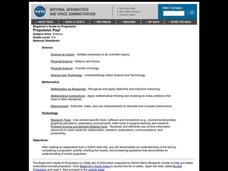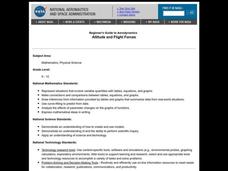Curated OER
Vectors in Relative Velocities Problem Set
Students, after reading an explanation from a NASA Web-based textbook, demonstrate an understanding of vector addition and the text by applying them to the determination of vector components and relative velocities.
Curated OER
Size Effects Problem Set
Students, after reading the Size Effects page from a NASA Web-based textbook, demonstrate an understanding of Size Effects by answering questions.
Curated OER
The Lift Equation Problem Set
High schoolers, after reading the Lift Equation page from a NASA Web-based textbook, demonstrate an understanding of the lift equation by answering questions.
Curated OER
Wind Tunnel Aerodynamics Problem Set
Students, after reading an explanation from a NASA Web-based textbook, demonstrate an understanding of the text by applying it to the calculation of area, velocity, and pressure in a wind tunnel.
Curated OER
Displacement Problem Set
Students calculate the length of a side of a triangle using a trigonometric function. They calculate the measure of an angle given two sides of a triangle with a trigonometric function.
Curated OER
Drag Problem Set
Students read an explanation from a NASA Web-based textbook and then demonstrate an understanding of the text by applying it to calculating drag of both full-sized and model gliders.
Curated OER
Density and Lift
Students, after reading from a NASA Web-based textbook, demonstrate an understanding of the text by solving problems on density and predicting which density give the most lift.
Curated OER
Why Invent That?
Students demonstrate an understanding of the text by completing an activity on the advantages and disadvantages of inventing and using a human-powered airplane.
Curated OER
NASA Glenn Research Center Mission : High-Speed Civil Transport (HSCT)
Students use World Wide Web resources to identify the problems and advantages of high-speed transportation. They download files and graphics and incorporate them into a word processed report.
Curated OER
Drag Equation - Level 1
Students, after reading the Drag Equation page from the NASA Web site, demonstrate an understanding of this equation and how drag is dependent on the variables included in the equation.
Curated OER
Drag Equation - Level 2
Students, after reading the Drag Equation page from the NASA Web-based textbook, demonstrate an understanding of this equation and how drag is dependent on the variables included in the equation.
Curated OER
Density
Students, in groups, design a procedure to calculate the mass of gas molecules in the classroom by measuring the volume of the classroom and researching the density of air. They apply changes in air density with altitude and effects on a...
Curated OER
Gas Properities Definitions
Students, after reading the Web page Gas Properties Definitions, complete the activity to demonstrate an understanding of the properties of gases.
Curated OER
Thrust to Weight Ratio
Students, after reading the Web page Thrust to Weight Ratio, use Range Games and the Air Page to complete the activity to answer questions about turbojet thrust to weight ratio.
Curated OER
What Would You Fly?
Learners, after reading an explanation from a NASA Web site, demonstrate an understanding of the text by writing an essay that applies the information found in the slides to a real-life question.
Curated OER
Propulsion Pop!
Students demonstrate an understanding of the text by completing a propulsion activity, charting the results, and answering questions that demonstrate an understanding of rocket propulsion.
Curated OER
Fuel and Air Relationships
Students use EngineSim and information found on the World Wide Web to complete the activity on the relationship between the atmosphere and jet fuel. They discover how much air is required to pass through a jet engine.
Curated OER
Altitude and Flight Forces
Students use the World Wide Web to access and use FoilSim. They also use the World Wide Web to access the NASA Glenn Web site for information relative to the factors involved with the flight of an airplane.
Curated OER
Temperature and Altitude
Students, after reading the explanation given below, use FoilSim to gather and record data on temperature and altitude generated by the FoilSim control panel.
Curated OER
Using 3-D Models for Code Validation with FoilSim
Students use FoilSim to complete the activity to create tables of data sets comparing the lift values for a 3-D model of a symmetrical wing section to the values predicted by the FoilSim software.
Curated OER
Lift Equation Problem Set
Pupils, after reading an explanation from a NASA Web-based textbook, demonstrate an understanding of the text by using it, along with FoilSim, to complete an activity to graph and interpret the lift equation.
Curated OER
Wing Area Effects Problem Set
High schoolers read an explanation from a NASA Web-based textbook on lift and an explanation on the FoilSim software package given below. They use FoilSim to evaluate the relationship between wing area and lift.
Curated OER
Velocity Effects Problem Set
Students, after reading an explanation on lift from a NASA Web-based textbook and an explanation on the FoilSim software package given below, use FoilSim to evaluate the relationship between velocity and lift.
Curated OER
The Paper Airplane Challenge: A Market Economy Simulation
Students have the opportunity to participate in a simulation that enables them explain the characteristics of a Market Economic System.
Other popular searches
- Aviation and Aerospace
- Aviation History
- Aviation Topics
- Aviation Powerpoint
- Applied Math for Aviation
- Careers in Aviation
- Aviation Lesson Plans
- History of Aviation
- Flight, Aviation
- Aviation Classroom Projects
- Aviation Industry
- Aviation Pioneers

























